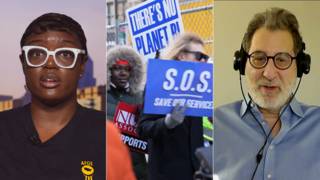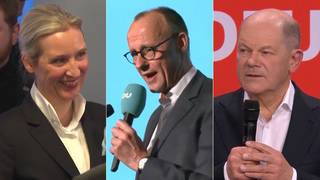
Related
Guests
- Kendal UnruhColorado delegate at the Republican National Convention and a leader in the national Never Trump movement.
- Raju ChinthalaIndiana state delegate at the Republican National Convention.
On Monday afternoon, the RNC briefly erupted in chaos when some opponents of presumptive presidential nominee Donald Trump stormed off the convention floor and others chanted in protest at their failure to win a symbolic vote opposing Trump’s candidacy. The high-profile floor fight pitted the Trump campaign and Republican National Committee leadership against a faction of delegates from the Never Trump movement, shattering any notion of a unified Republican Party. While Trump’s detractors acknowledge they were unlikely to be able to vote down the rules, they say they were seeking a roll call vote to register their dissent over a Trump candidacy. For more, we host a debate. Kendal Unruh is a Colorado delegate at the Republican National Convention and a leader in the national Never Trump movement. Raju Chinthala is an Indiana state delegate who is backing Donald Trump.
Transcript
AMY GOODMAN: This is Democracy Now!, democracynow.org, “Breaking with Convention: War, Peace and the Presidency.” I’m Amy Goodman. We’re in Cleveland, Ohio, covering the Republican National Convention, inside and out, from the streets to the corporate suites to the convention floor, as we will be next week in Philadelphia at the Democratic convention, our daily hour broadcast expanded to two hours. If you don’t get to see both on your station or listen to, go to democracynow.org. It’s all there—transcript, audio, video.
To talk more about Donald Trump at Monday’s floor fight at the Republican National Convention, we’re joined by two delegates. Kendal Unruh is Colorado delegate at the Republican convention, leader in the national Never Trump movement. Raju Chinthala is an Indiana state delegate who backs Donald Trump.
We welcome you both to Democracy Now! Well, Kendal Unruh, can you explain what took place, what that chaos and the fight was all about yesterday?
KENDAL UNRUH: Sure. Well, the chaos started on Thursday with the overreach and the power grab that the RNC and the establishment elite, in tandem with Donald Trump now, where they actually made it very evident that they didn’t want any conservative voice or any of the grassroots that are active in the party being active anymore. And they basically set themselves up as king in the authoritarian dictatorship, in essence, because one of the rules that they passed—and they did it without allowing full debate, and they did it without just a fair process—so, what they did was they put all the power into the hands of the RNC, basically silencing the voices of the grassroots delegates. They can make any decision they want, at any given time they want, in between conventions, without anybody weighing in and having a vote. So, in essence, everything that we’re doing as a convention and everything that we’re doing as delegates is basically irrelevant. So, if they’re going to want to mitigate the fact that you have a convention, don’t have a convention. Why bring us into the picture just to be staging as a backdrop for the nomination process?
AMY GOODMAN: Well, explain what the call was for a roll call vote.
KENDAL UNRUH: Sure. Well, the roll call vote was very simple. We wanted to have our votes counted. The very sanctity of a vote being counted is core in the very hearts of every American, as they want their vote to be counted. And so, it was—we had followed the procedure in order to submit the petitions. And the problem is, they then said that three states withdrew. Well, we don’t have access to see if that’s true, because when we were whipping our votes, we had solid votes on there. So, we don’t know if that narrative is true or not. And we are suspecting, based on the history of the RNC, that it’s simply not, because they had a lot at stake, and if we had had a vote on that, then there was—we would have been kicked back to the 2012 rules, the Rules Committee would have had to reconvene, and the rules would have had a different outcome, most likely.
AMY GOODMAN: Which state delegations were calling for the roll call vote?
KENDAL UNRUH: Well, there were 10. So, you had Washington and Idaho and Utah and Colorado and Iowa. Anyway, we submitted 10. And—
AMY GOODMAN: So let me ask Raju Chinthala. You support Donald Trump. You’re from the state of Indiana, where his running mate is from, Governor Pence.
RAJU CHINTHALA: Correct.
AMY GOODMAN: Why didn’t you want this to take place yesterday?
RAJU CHINTHALA: I don’t know. This is my first convention. Most of the time, especially in a large convention like this, going and asking for every vote is difficult. There are so many thousands of people. And in the past, if ever done a roll call, I’m not sure; I don’t know the history of convention. But usually, most of these convention, when they pass the rules, it’s, you know, [inaudible]. And so, they approve those amendments or policies.
KENDAL UNRUH: Well, a roll call vote takes about 15 minutes, because the delegation chairs actually go and individually poll the delegates in their delegation. They submit that to the chair. So, you know, timing, in order to say, well, it would have taken too much time to actually accurately reflect a vote, I don’t buy that. And of course they can do the yeas or the nays. I mean, that’s—but that’s how you railroad a meeting. And going back to 2012, when John Boehner—when the convention erupted in an obvious no, and it was on the teleprompter, “The ayes carry.” And he slammed the gavel down, and that was that. That’s how they railroad a meeting. They actually flew in a technology expert in on a private plane to shut the microphones down and manipulate the microphones. So we already anticipated that we would never be recognized. Hence the fact that someone had to go up to the front of the convention in order to make a motion, because all those microphones, once again, were just staging. We had senators and congressmen strategically placed in order to make the motion, and of course they were subsequently ignored, once again proving—and hence the black, because I’m in mourning, because what you saw was—you had Donald Trump with his foot already on the oxygen cord of the conservative movement. And the power grab from Thursday rules going into yesterday, silencing the votes of those who truly wanted a fair and accurate vote count, truly signifies the death of the conservative grassroots movement, because they now have all the power and control. And there’s just simply nothing we can do about it but sit back and smile pretty and be the backdrop for the king that they’re coronating.
AMY GOODMAN: Well, let’s talk about what motivated this. It’s your anger against Donald Trump. You don’t accept him as the Republican presidential nominee. Why?
KENDAL UNRUH: Well, because he’s not a Republican. People say, “Well, would you have done this if anybody else had been the nominee?” And I said I—this is my eighth convention. The last seven, I have fallen in line and went out, and I canvassed my neighborhoods for those nominees. But that’s the key point, because he’s asking now the base to be mobilized for him, to go out and work, when he—we’ve been treated like this. We are the ones who go out, and we knock on our neighbors’ doors, and we lick stamps, and we make those phone calls. That’s how you get elected. So, rather than earn our support with messaging, and work to earn our support and our vote, he did the exact opposite. He has said in the past, “I don’t need conservatives to win. It’s not the conservative party, it’s the Republican Party. And it’s going to be the workers’ party in 10 years.” Great. Well, you’ve certainly proven that in your very first course of action that you could take. You said, “You are mitigated now, grassroots. I don’t care about you. I’m not going to listen to you. And if I hear you, I’m going to ignore you.”
AMY GOODMAN: Raju Chinthala, what do you like about Donald Trump?
RAJU CHINTHALA: So there’s a process for primary elections. That’s why we have this long, almost a year length of a process, where it starts from Iowa, the elections, and the people will vote for one of the primary. And if the democratic process works and the candidate who puts his strategy into the waters and he gets the majority of the delegates or votes around the states, and, of course, in Indiana, it ended. Out of 13 or 16 candidates, he stood up. He has his own strategies to campaign, take his voice to the American people, so that these people in the primary elections, they vote. And that’s why we have all this process, not just—
AMY GOODMAN: Did you vote for—did you vote for Donald Trump?
RAJU CHINTHALA: Yes.
AMY GOODMAN: Why do you support him?
RAJU CHINTHALA: I think there are three things here, very important. In the democratic—I mean, in the Republican Party, with the democratic process, what we have is a strategy, a campaign material, that campaign voice he takes. One is the safety. Safety is the most important. Right now, we are in fear. The America is attacked by many times, and we not done anything. Second is, we have to stop illegal immigrants coming into this country. Third is jobs. I came here for job. I came here 20 years ago for a job.
AMY GOODMAN: From?
RAJU CHINTHALA: From India. I came here on H-1B visa. I got my job in Michigan. I went through the process. It took 13 years for me to get the passport to become a citizen, which is a dream come true. This is a land of opportunities. The jobs are moving out of—outside this country. And so, if I look at it, my kids, my next and grandkids and all those, it is pathetic to see how we are going to, as America, to have all these—where we used to have all this, 20, 30 years ago, we all come here because of all these opportunities.
AMY GOODMAN: Kendal Unruh, why are you opposed to Donald Trump? What are the key issues?
KENDAL UNRUH: Sure, let’s talk about the economic policies, because he has actually been a very strong proponent for tariffs. And the Republican Party is all about free trade. We are not for tariffs. And we’ve actually been very explicit about that in our platform, because when you are slapping a 25 to 35 percent tariff on consumer goods that are being imported, the consumers pay that. And I’ve actually brought that up in a simple economics 101 lesson, and they said, “Well, I’m willing to pay that.” No, you’re really not. You’re not willing to pay $120 for a $60 pair of shoes, and times that by four for—to put them on your family. But so, he’s going to penalize the companies when they come back, when he forces them back, because they’ve been—actually, have left America because of regulations and taxation. And his very promise was, well, if you come back, I’m going to be now increasing the corporation tax rate to 14.25 percent. Once again, corporations don’t pay taxes; consumers pay taxes. And so, even economically, it’s not going to make America great again. It’s going to drive America broke.
AMY GOODMAN: Who did you support?
KENDAL UNRUH: I supported Ted Cruz.
AMY GOODMAN: Let’s talk about the themes that Donald Trump has doubled down on. The building of the wall with Mexico, your thoughts on this, Raju?
RAJU CHINTHALA: I think it’s not just the wall, but it’s more important is how to secure our borders so that the drugs and illegal immigrants doesn’t cross the border.
AMY GOODMAN: And let’s add to that barring Muslims from coming into the country.
RAJU CHINTHALA: I don’t agree with all Muslims. I think there are countries—
AMY GOODMAN: You mean you don’t agree with all Muslims being barred.
RAJU CHINTHALA: Correct, that there are countries where terrorism is more active, that those countries are not able to do anything. And we should identify those countries where the terrorism is more and activities is more, so that they don’t come just on tourist visa or any other visa.
AMY GOODMAN: Let me go to Donald Trump during a debate in January on Fox Business. Donald Trump reiterated his plan to bar all Muslims from entering the country.
MARIA BARTIROMO: Your comment about banning Muslims from entering the country created a firestorm. According to Facebook, it was the most talked-about moment online of your entire campaign, with more than 10 million people talking about the issue. Is there anything you’ve heard that makes you want to rethink this position?
DONALD TRUMP: No. No. Look, we have to stop with political correctness. We have to get down to creating a country that’s not going to have the kind of problems that we’ve had with people flying planes into the World Trade Centers, with the—with the shootings in California, with all the problems all over the world. I just left Indonesia—bomb, bomb, bomb, bomb.
AMY GOODMAN: Kendal Unruh, your response?
KENDAL UNRUH: Well, it’s very disconcerting to hear the crowd cheering the fact that he’s wanting to ban an entire segment of people of faith. I’m an evangelical Christian. The Founding Fathers established the First Amendment for the sole purpose of making sure you can never apply a religious litmus test to anybody from coming into America. And it is grievous, the fact that he thinks that he can use the heavy hand of government to make sure that doesn’t happen, because I tell my Christian friends, “Fill in the blank next time with 'Christian,' that he wants to ban all Christians, because if you give the government that much power and control, you’re next.”
Now, talking about vetting, that’s a different subject. Everybody who comes into our nation needs to be vetted. We need to secure those borders. So, the fact that he wants to ban everybody is not—is ludicrous on its face, is obviously demagoguing to the fear that people have against Muslims. And vetting people coming in is a different story. You have to vet everybody. I don’t care if they even claim to be a Christian. I mean, you vet everybody.
AMY GOODMAN: The issue of abortion?
RAJU CHINTHALA: Coming back to the Muslims, and yesterday, if you see the Mrs. Trump speech, it’s clearly said, good Muslims and bad Muslims. And we all have, in every religion, good or bad. However we want to take the religion out of politics, religion plays a critical role in the politics. It’s not just this election, every election, whether it’s the Democratic Party, whether it’s the Republican Party. And to win elections, they always talk about politic—I mean, religion. So, here, yesterday, when they said good Muslims needs to take care of bad Muslims in their own countries, where the Muslim population is more, so we don’t have that—to screen that.
AMY GOODMAN: Abortion?
RAJU CHINTHALA: Abortion—
AMY GOODMAN: I’m asking you especially given that Governor Pence is the vice-presidential running mate. Both he and Donald Trump now fiercely opposed to abortion, though Donald Trump wasn’t always opposed to abortion. Do you share the governor’s and Donald Trump’s views on this? You’re close to Governor Pence, is that right?
RAJU CHINTHALA: I’m in the middle of those two. So, I come from a Hindu faith. And we all believe the protector of every life, and the life starts, you know, when they’re conceived in the womb. So, that depends on—I’m also a medical professional. It all depends on how the mother needs to be done. And the abortion, if needs protect the life of mother, in most of the healthcare—medical conditions, that should be done.
KENDAL UNRUH: Well, and, actually, our platform has always been extraordinarily conservative on the sanctity of life. And that was actually one of the flipping points for me against Donald Trump, when he mocked the reporter with disabilities, because as a mom who lost a child to their disabilities, it sent a message to me that he alone gets to determine who has value and who does not. It screamed the message that—who is he to determine what the sanctity of life is and where the value is on life? Because we’re all created—
AMY GOODMAN: Were you shocked when he did that?
KENDAL UNRUH: I was repulsed.
AMY GOODMAN: The New York Times reporter.
KENDAL UNRUH: I was so repulsed. And then, it was at that moment I decided I will do everything I can to make sure he does not get this nomination, because it revealed his heart. And I believe that a candidate and what he values and who he is is reflected in the hearts of his supporters. And I’ll tell you, we have been—when we have been high-profile and vocal against Donald Trump—delegates, Rules Committee members, etc.—the backlash has been nothing like I’ve ever seen in politics. And I call them soft thug techniques, the amazing threats and coercion and intimidation. And I say, look, once again, he can’t do that to voters in the general election. He can do it in this small, contained environment of delegates. He can extort and force votes out of them. But he certainly can’t do it running against Hillary Clinton.












Media Options